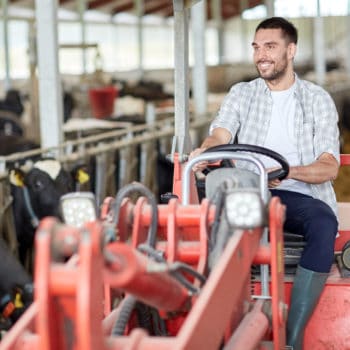Why We Love It
-
$69,880Potential Avg. Salary
-
-1.9%Job Growth Rate
-
Outdoor Work EnvironmentCareer Attribute
-
Skill-Based WorkCareer Attribute
Farmers and farm managers oversee crop production, livestock management, and dairy production on both large and small farms. They plant and harvest crops, and buy and sell livestock, primarily for the purposes of generating food. They utilize a variety of different types of machinery to plant and harvest.
Recommended Schools
What is a Farmer or Farm Manager?
The following job responsibilities are common for individuals in farmer and farm manager roles:
- Plan farm outputs each year by reviewing market conditions and selecting crops to grow to encourage high profitability
- Purchase livestock to manage on farms, and sell livestock to livestock buyers and/or butchers
- Harvest crops, milk cows, and perform other activities related to collecting produced foods
- Plant and harvest crops using a variety of different types of heavy machinery
- Care for farm animals, assist with births, and ensure animals are properly cared for
A Day in the Life
Farmers and farm managers oversee operations on both large and small farms. On their farms, they may focus on growing crops, raising livestock, or producing dairy, or they may do some blend of each activity. On small farms, a single farmer may perform all of the necessary tasks with one or more farmhands. On larger farms, farm managers oversee all operations and manage a variety of agricultural workers. Many farmers operate small or mid-sized family farms where operations are all controlled by family members.
At the beginning of the growing season, farmers plan their crops for the year. To do so, they research market conditions to determine what can be grown that will be most profitable for the year. They also plan fail-safes to reduce risk. For example, corn may be the most profitable, but the farmer may grow both corn and tobacco to reduce his/her risk if the corn crop is damaged or diseased and cannot be sold. Once planned, the farmer gets to work planting, and then harvests the crops once they’re mature.
On livestock and dairy farms, farmers and farm managers typically care for dozens or hundreds of cows, chickens, pigs, and other animals that are used for food. They purchase needed livestock from auctions or livestock buyers, and they create environments that promote health, growth, and breeding. Livestock farms have work year-round and are not as seasonally influenced as crop farms.
Most modern farmers produce foods for food-processing companies, though the growing popularity of farmer’s markets and community-supported agriculture (CSA) organizations has increased their ability to make higher profits by selling produce and meats directly to consumers.
Typical Work Schedule
Most farmers and farm managers work at least full-time hours, though it’s not uncommon in this career to work overtime. Many work from sunrise to sunset, especially during harvesting seasons. Those who operate crop farms may work longer hours during the planting and harvesting season and fewer hours in winter, though they spend time in non-growing seasons planning for the upcoming year.
Farmer and Farm Manager Specializations
- Farmers generally specialize in growing crops and oversee operations on small, mid-sized, and family-operated farms.
- Farm or agricultural managers oversee operations on farms or lands owned by other individuals, particularly on farms owned by food distribution companies.
- Ranchers generally specialize in livestock farms and may keep dairy cows, food cows, horses, sheep, chickens, and other animals who produce sellable materials or can be sold to butchers.
Typical Employers
Most farmers and farm managers are self-employed. Those who aren’t self-employed typically work for farmers, farm managers, or food distribution companies as farmhands or agricultural workers.
Recommended Schools
How To Become a Farmer or Farm Manager
Many farmers and farm managers find work in the field with only a high school diploma. Many farmers grew up learning the skills of farming and ranching on family-owned farms, and take over operations of those farms or purchase their own farms after completing high school. Some others begin their careers working as farmhands or agricultural workers for other farmers, and move into farm ownership or farm management later in their careers after gaining ample professional experience.
However, because it is becoming increasingly difficult to run a profitable farm, more aspiring farmers are choosing to pursue college degrees to learn business skills on top of their knowledge of farming. With an associate’s or bachelor’s degree in a related field, such as business or agricultural management, aspiring farmers are better prepared with the skills they need to analyze market conditions, make sound and profitable purchases and decisions, and market their goods and produce within the community.
While a degree is helpful, it is rarely required, and the best approach to becoming a farmer is to find work at a farm. By working alongside an experienced farmer or manager and helping with production, management, and harvesting year after year, you’ll have the tools you need to succeed as a farmer on your own land or a farm manager on someone else’s land later in your career.
Farmer or Farm Manager Salary Data
We’ve provided you the following to learn more about this career. The salary and growth data on this page comes from recently published Bureau of Labor Statistics data while the recommendations and editorial content are based on our research.
National Anual Salary
Low Range
$45,930Average
$69,880High Range
$113,140National Hourly Wage
Low Range
$22/hrAverage
$34/hrHigh Range
$54/hrHow do Farmer or Farm Manager salaries stack up to other jobs across the country? Based on the latest jobs data nationwide, Farmer or Farm Manager's can make an average annual salary of $69,880, or $34 per hour. On the lower end, they can make $45,930 or $22 per hour, perhaps when just starting out or based on the state you live in.
Salary Rankings And Facts
#200 Nationally for All Careers
Above Average Salary Nationally
Programs and Degrees
Here are the most common degrees for becoming a Farmer or Farm Manager. a is usually recommended and specifically a degree or coursework that prepares you for the particular field, see below.
Highest Education Among Farmer or Farm Managers
- 0.9% Doctorate
- 3% Masters
- 18.3% Bachelors
- 9.1% Associates
- 19.8% College
- 36.9% High School
- 12% Less than High School
Job Growth Projections and Forecast
2014 Total Jobs
929,8002024 Est. Jobs
911,700Job Growth Rate
-1.9%Est. New Jobs
-18,100How does Farmer or Farm Manager job growth stack up to other jobs across the country? By 2024, there will be a change of -18,100 jobs for a total of 911,700 people employed in the career nationwide. This is a -1.9% change in growth over the next ten years, giving the career a growth rate nationwide of Above Average.
Growth Rankings And Facts
#651 Nationally for All Careers
Above Avg. Growth Nationally
What Companies Employ The Most Farmer or Farm Managers
| Industry | Current Jobs | New Jobs Needed | % Increase |
|---|---|---|---|
| Self-employed workers | 657,700 | 8,500 | 9% |
| Crop production | 152,000 | -18,900 | -19% |
| Animal production and aquaculture | 105,600 | -7,800 | -8% |













